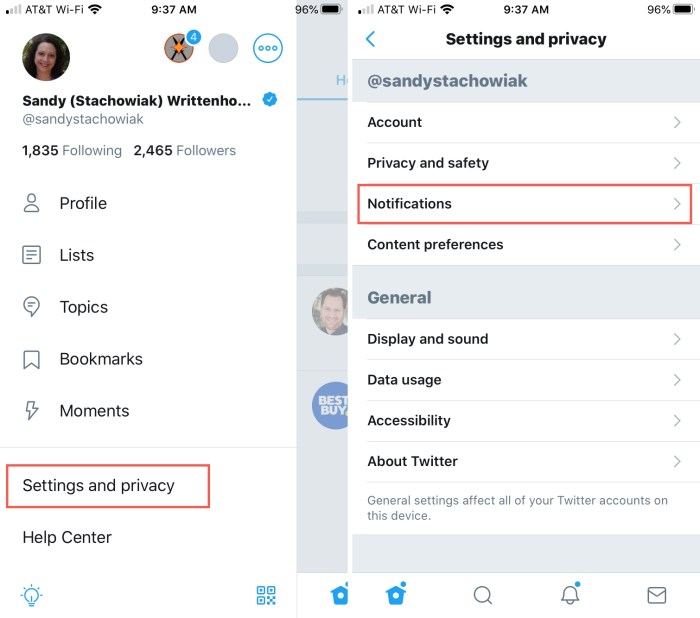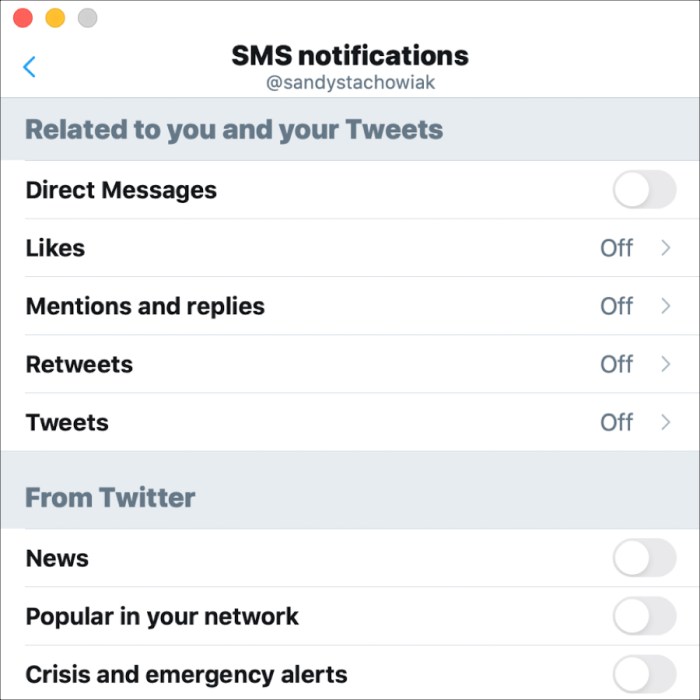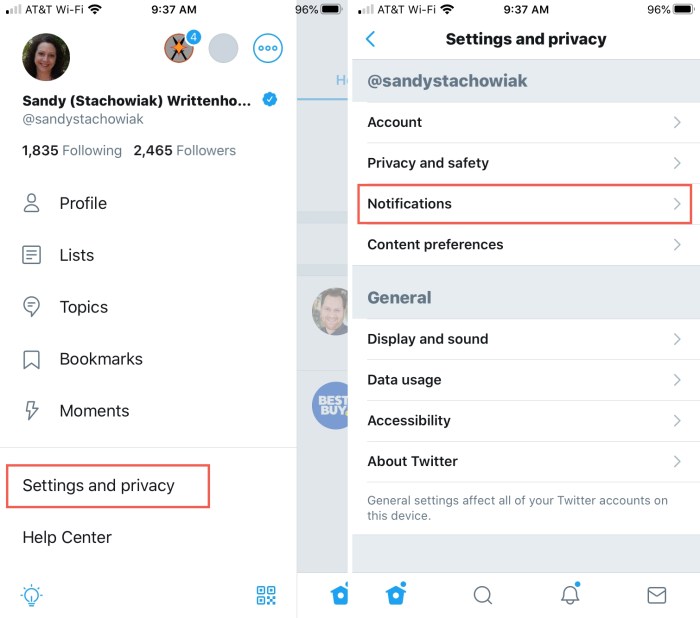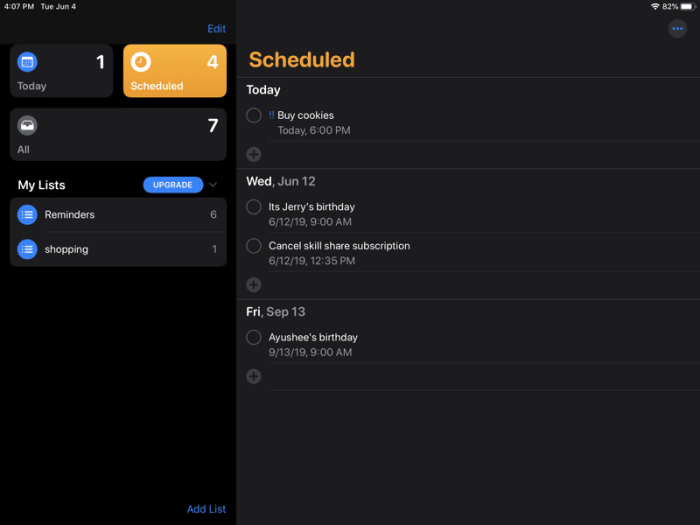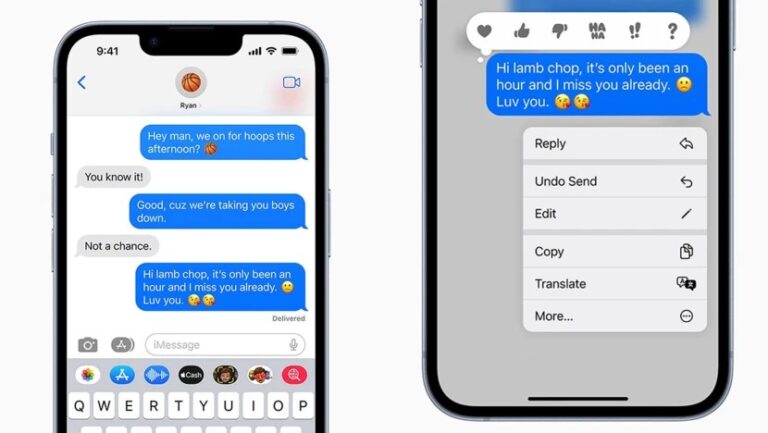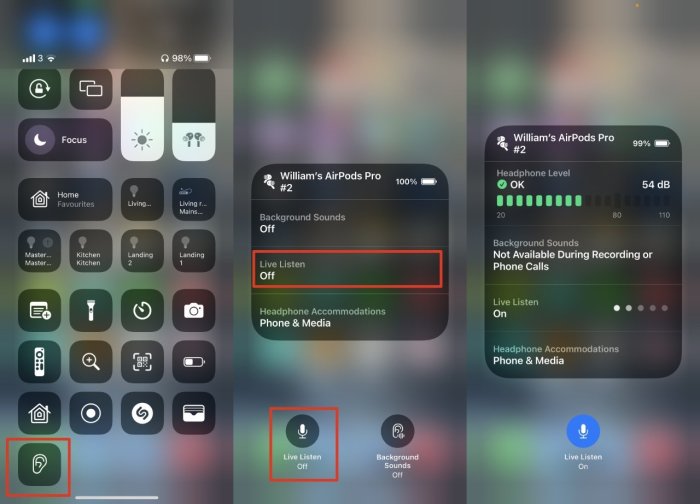How To Get Alerts From Your Favorite Twitter Accounts
How to get alerts from your favorite Twitter accounts is a question many social media users ask. It’s a great way to stay up-to-date on the latest news, trends, and discussions from your favorite people and brands. Whether you want to be notified about new tweets, replies, or mentions, Twitter offers a variety of tools and features to help you stay connected.
This guide will walk you through the different ways to customize your notifications and receive alerts for specific accounts, content types, and even s. From using Twitter’s built-in features to exploring third-party apps and services, you’ll learn how to fine-tune your notification settings to create a personalized experience that fits your needs.
Understanding Twitter Notifications
Twitter notifications are a valuable tool for staying connected with your favorite accounts and keeping up with the latest news and trends. They can alert you to new tweets, retweets, mentions, and other activities that are relevant to you.
Types of Twitter Notifications
Twitter offers a variety of notification types to cater to different preferences. Understanding the differences between these notification types will help you tailor your notifications to receive only the information that matters to you.
- Mentions: These notifications alert you whenever someone mentions your Twitter handle in a tweet. This is a great way to stay on top of conversations that involve you.
- Retweets: When someone retweets your tweet, you’ll receive a notification. This indicates that your tweet has been shared with a wider audience, increasing its visibility.
- Likes: When someone likes your tweet, you’ll receive a notification. This is a simple way to see which of your tweets are resonating with others.
- New Followers: You’ll receive a notification whenever someone starts following your account. This can be a good way to connect with new people who are interested in your content.
- Direct Messages: If someone sends you a direct message, you’ll receive a notification. Direct messages are private conversations between two users.
- Quote Tweets: When someone quotes your tweet, you’ll receive a notification. This indicates that someone is using your tweet to share their own thoughts or opinions.
Benefits of Receiving Notifications
Receiving notifications from your favorite accounts can be highly beneficial, offering a range of advantages that enhance your Twitter experience.
- Stay Updated: Notifications help you stay up-to-date with the latest news, trends, and information from accounts you follow. You won’t miss important tweets or announcements.
- Engage with Content: Notifications prompt you to engage with the content you receive. You can respond to tweets, retweet them, or like them, fostering a more interactive experience.
- Build Connections: Notifications can help you build connections with your favorite accounts. You can reply to tweets, start conversations, and participate in discussions.
- Personalize Your Experience: You can customize your notification settings to receive only the alerts that are relevant to you. This ensures that you don’t get overwhelmed by notifications.
Enabling Notifications for Specific Accounts
Okay, so you’ve got your notifications set up, but now you want to get alerts from specific accounts. This is where things get really fun! You can tailor your Twitter experience to get exactly the information you want, when you want it.
Enabling Notifications
You can enable notifications for specific accounts so you don’t miss any of their tweets. This is super helpful for staying up-to-date with your favorite accounts, whether they’re your friends, news sources, or industry leaders. Here’s how to do it:
- Go to the account’s profile:Click on the account’s username to go to their profile page.
- Click the bell icon:You’ll see a bell icon next to the “Follow” button. Click on it to turn on notifications.
- Choose your notification settings:A pop-up will appear, allowing you to customize your notification preferences. You can choose to receive notifications for tweets, retweets, replies, or all of the above.
Customizing Notification Settings
Once you’ve enabled notifications, you can customize them to your liking. This means you can control exactly what kind of notifications you get, so you’re not overwhelmed with alerts.
- Different Content Types:You can choose to receive notifications for different types of content. For example, you might want to get notifications for tweets only, or you might want to get notifications for retweets and replies as well.
- Specific s:If you’re only interested in specific topics, you can use s to filter your notifications. For example, if you’re following a tech news account, you might only want to get notifications for tweets that mention “artificial intelligence”.
- Frequency:You can also control how often you receive notifications. You can choose to get notifications immediately, or you can choose to get them in a digest format, which is a summary of all the notifications you’ve missed over a certain period of time.
“Customizing your notification settings can help you stay informed without being bombarded with alerts. You can tailor your Twitter experience to get exactly the information you want, when you want it.”
Using Twitter’s Built-in Features
Twitter provides a variety of built-in features that you can use to manage your alerts from your favorite accounts. These features can help you stay organized and make sure you don’t miss important updates.
Managing Alerts in the Notifications Tab
The “Notifications” tab is a central hub for all the alerts you receive on Twitter. This tab allows you to view and manage notifications from various sources, including mentions, replies, retweets, likes, and direct messages. Here’s how to navigate and manage your notifications:* Accessing the Notifications Tab:Click on the bell icon in the top navigation bar of your Twitter homepage.
This will take you to the “Notifications” tab.
Filtering Notifications
You can filter notifications by type using the tabs at the top of the “Notifications” tab. For example, you can choose to view only mentions, replies, or direct messages.
Marking Notifications as Read
You can set up notifications for your favorite Twitter accounts to keep up with their latest posts, but if you’re trying to share something specific with a friend, try using screen sharing in Messages for Mac instead. Check out How to use screen sharing in Messages for Mac for a quick guide.
It’s a much more interactive way to share information, especially when you want to point out something specific on a web page or app.
To mark a notification as read, click on the small circle next to it. This will change the color of the circle to gray, indicating that you have seen the notification.
Turning Off Notifications
If you want to stop receiving notifications from a specific account, you can mute them. To mute an account, go to their profile and click on the three dots next to the “Follow” button. Then, select “Mute.”
Creating Custom Lists
Creating custom lists is a great way to organize your favorite accounts and stay up-to-date on their latest content. With lists, you can group together accounts that share similar interests or topics. This can help you streamline your Twitter feed and make it easier to find the content you’re looking for.
Here’s how to create a custom list:* Go to your profile:Click on your profile picture in the top left corner of your Twitter homepage.
Click on “Lists”
Select the “Lists” tab from your profile menu.
Create a new list
Click on the “Create new list” button.
Name your list
Choose a descriptive name for your list.
Make your list public or private
A public list can be viewed by anyone on Twitter, while a private list is only visible to you.
You can get notifications from your favorite Twitter accounts by enabling notifications in the app settings. But if you’ve locked yourself out of your phone, you might need to reset it. Check out this guide on How to reset a locked iPhone or iPad without a computer in iOS 15.2 before you do, though! Once you’re back in, you can easily set up those Twitter alerts.
Add members
Start adding accounts to your list. You can add accounts from your timeline or by searching for them.
Manage your lists
You can edit, delete, or add accounts to your lists at any time.
Utilizing Third-Party Apps and Services
Sometimes, Twitter’s built-in notification features just aren’t enough. If you need more control or want to get alerted in a different way, there are plenty of third-party apps and services that can help. These apps can provide advanced filtering, customizable alerts, and even integrate with other tools you use.
Popular Third-Party Apps and Services
Third-party apps and services offer a wider range of features and flexibility compared to Twitter’s built-in notification system. Here are some of the most popular options:
- TweetDeck: A popular web-based app that lets you manage multiple Twitter accounts, schedule tweets, and create custom streams for specific topics or users. You can set up notifications for mentions, s, and even specific hashtags. TweetDeck offers a more visual and customizable way to monitor your Twitter feed and receive notifications.
- Hootsuite: Another popular social media management platform that integrates with Twitter. Hootsuite allows you to schedule tweets, track your performance, and set up custom alerts for s, mentions, and more. It’s a powerful tool for managing multiple social media accounts, including Twitter, and getting notified about important events.
- IFTTT (If This Then That): This service allows you to create automated workflows, known as “applets,” that connect different apps and services. You can use IFTTT to create alerts from Twitter by setting up applets that trigger actions based on specific events, such as a tweet from a particular account or a new tweet containing a specific .
For example, you can create an applet that sends you a notification to your phone whenever your favorite band tweets.
- Social Mention: This service monitors social media conversations about specific s or brands. You can use Social Mention to track mentions of your brand or industry, and receive notifications whenever someone mentions you online. This is a useful tool for monitoring your online reputation and staying up-to-date on what people are saying about you.
Setting Up Email or SMS Alerts
Want to be notified instantly when your favorite Twitter accounts post new content? Setting up email or SMS alerts is a great way to stay in the loop and never miss a tweet. You can configure these alerts directly through Twitter’s settings or use third-party apps and services.
Email Alerts
Email alerts are a straightforward way to receive notifications about new tweets. Twitter’s built-in notification system allows you to receive emails whenever someone you follow posts a new tweet. Here’s how to set up email alerts:
- Log in to your Twitter account and navigate to your profile settings.
- Select the “Notifications” tab.
- Under “Email Notifications,” check the box next to “New tweets from accounts you follow.”
- You can also customize the frequency of these notifications. For example, you can choose to receive notifications only for tweets from specific accounts or for all new tweets.
Email alerts offer several advantages, including:
- Convenience:Email is a widely used communication method, making it accessible to most users.
- Detailed Information:Email notifications often include the full tweet content, allowing you to quickly grasp the message without visiting Twitter.
- No Additional Apps:You don’t need to download or use any third-party apps to receive email alerts.
However, email alerts also have some disadvantages:
- Spam Risk:If you receive numerous email alerts, they can clutter your inbox and get lost among other messages.
- Delayed Notifications:Email delivery can be slightly delayed, especially if you’re using a free email service.
- Limited Customization:You might not have as much control over the frequency or content of email notifications compared to third-party apps.
SMS Alerts
For those who prefer instant notifications, SMS alerts are a great option. These alerts send a text message to your phone whenever a new tweet is posted by an account you follow.To set up SMS alerts, you’ll need to link your phone number to your Twitter account:
- Log in to your Twitter account and go to your profile settings.
- Select the “Mobile” tab.
- Enter your phone number and verify it through a confirmation code.
- Once your phone number is linked, you can enable SMS alerts for new tweets from your favorite accounts.
SMS alerts offer several benefits:
- Instant Notifications:SMS messages are delivered almost instantly, ensuring you’re alerted as soon as a new tweet is posted.
- Accessibility:SMS messages can be accessed on any phone, regardless of whether you have internet access.
- Compact Information:SMS notifications typically display a brief summary of the tweet, keeping them concise and easy to read.
However, SMS alerts also have some drawbacks:
- Character Limit:SMS messages have a limited character count, so you might not receive the full tweet content.
- Cost:Sending and receiving SMS messages can incur charges, depending on your mobile plan.
- Privacy Concerns:Sending SMS alerts to your phone number can raise privacy concerns, especially if you use the same number for other purposes.
Managing Notification Overload
Twitter notifications can be a powerful tool for staying up-to-date on the latest news and information from your favorite accounts. However, too many notifications can quickly become overwhelming and distracting. To avoid information overload, it’s important to manage and filter your notifications effectively.
Customizing Notification Settings
Customizing your notification settings is a key step in managing notification overload. By tailoring these settings, you can receive alerts only for the content that matters most to you. Here are some strategies for customizing your notification settings:
- Choose specific notification types:Twitter offers various notification types, including mentions, retweets, replies, direct messages, and more. You can select the specific types of notifications you want to receive. For example, if you’re only interested in getting notified about mentions, you can disable notifications for other types.
- Filter notifications by account:You can choose to receive notifications from only specific accounts. This can be particularly helpful for managing notifications from accounts that are highly active or that you follow for specific content.
- Set notification frequency:Twitter allows you to adjust the frequency of notifications you receive. You can choose to receive notifications instantly, or you can opt for a summary of notifications at a specific time interval.
- Use mute features:Twitter offers a mute feature that allows you to temporarily silence notifications from specific accounts or s. This can be useful for managing notifications from accounts that are particularly noisy or that you want to avoid for a period of time.
Exploring Twitter’s Advanced Search Options: How To Get Alerts From Your Favorite Twitter Accounts
Twitter’s advanced search feature provides a powerful way to refine your searches and find specific types of content. It allows you to narrow down your results by various criteria, such as s, accounts, dates, and more.
Setting up notifications from your favorite Twitter accounts is super easy! You can get alerts for new tweets, retweets, or even replies. It’s like having a personal news feed for your favorite influencers. And speaking of convenient things, you can also add your driver’s license to Apple Wallet , so you never have to worry about forgetting it again.
Back to Twitter, once you’ve got your notifications set up, you can chill and catch up on all the latest updates from your favorite accounts.
Using Advanced Search Operators, How to get alerts from your favorite Twitter accounts
Advanced search operators are special symbols and s that help you specify your search criteria. These operators allow you to create more precise searches and find exactly what you’re looking for. Here are some common operators:
- ” “(Quotes): Enclose a phrase in quotes to find tweets containing that exact phrase. For example, “best pizza in New York” will find tweets mentioning that exact phrase.
- #(Hashtag): Use a hashtag to find tweets related to a specific topic. For example, #travel will find tweets about travel.
- from:(Account): Specify an account to find tweets from that particular account. For example, from:elonmusk will find tweets from Elon Musk’s account.
- to:(Account): Specify an account to find tweets sent to that particular account. For example, to:elonmusk will find tweets sent to Elon Musk’s account.
- –(Exclusion): Exclude a word or phrase from your search results. For example, “best pizza” -New York will find tweets mentioning “best pizza” but not “New York.”
- since:(Date): Find tweets published after a specific date. For example, since:2023-01-01 will find tweets published after January 1, 2023.
- until:(Date): Find tweets published before a specific date. For example, until:2023-01-01 will find tweets published before January 1, 2023.
Example Search Query
Let’s say you want to find tweets from the account @nytimes about the topic of climate change. You can use the following search query:
from:nytimes #climatechange
This query will find tweets from the New York Times account that contain the hashtag #climatechange.
Leveraging Twitter’s API for Custom Notifications
For those seeking a truly tailored experience, Twitter’s API (Application Programming Interface) unlocks a world of possibilities. The API empowers you to craft custom notification systems, going beyond the limitations of Twitter’s built-in features. This means you can receive alerts based on specific criteria, such as s, mentions, or even real-time trends.
Using Webhooks for Real-Time Notifications
Webhooks are a powerful tool for receiving instant updates from Twitter. They act as a bridge between your application and Twitter, allowing for real-time communication. When a specific event occurs on Twitter that matches your defined criteria, the API sends a notification to your application via a webhook.
A webhook is essentially a callback mechanism that allows applications to subscribe to real-time events and receive notifications whenever those events occur.
Here’s a simple code snippet demonstrating how to receive notifications via a webhook using Python:“`pythonimport requestsdef handle_tweet(data): # Process the tweet data here print(f”New tweet from data[‘user’][‘screen_name’]: data[‘text’]”)def webhook_handler(request): if request.method == ‘POST’: data = request.json() handle_tweet(data) return ‘OK’ else: return ‘Invalid request method’# Replace with your actual webhook URLwebhook_url = ‘https://your-webhook-url’# Create a new webhookresponse = requests.post( f’webhook_url/webhooks’, json=’url’: ‘https://your-app-url/webhook’)# Handle the responseif response.status_code == 200: print(‘Webhook created successfully’)else: print(‘Error creating webhook’)“`This code demonstrates the basic setup of a webhook:
- It defines a function to handle incoming tweet data.
- It sets up a webhook handler that listens for POST requests from Twitter.
- It creates a new webhook using the Twitter API.
This is just a simplified example, and you’ll need to adjust it based on your specific needs. You’ll need to set up a server to handle webhook requests and configure the webhook URL in your Twitter application settings.
Summary
Staying connected with your favorite Twitter accounts is easier than ever with the right tools and techniques. By leveraging Twitter’s built-in features, third-party apps, and even advanced search options, you can create a tailored notification system that keeps you informed about the content that matters most to you.
Remember to experiment with different settings and strategies to find what works best for you and avoid notification overload. So, go ahead and dive into the world of Twitter notifications and discover the power of staying connected.
FAQ Explained
Can I receive notifications for tweets from specific accounts even if I don’t follow them?
Yes, you can! You can enable notifications for any account, whether you follow them or not. This is useful for staying up-to-date on accounts you’re interested in, but don’t want to necessarily follow.
What are the best third-party apps for managing Twitter notifications?
Some popular third-party apps include TweetDeck, Hootsuite, and Buffer. These apps offer features like custom dashboards, advanced filtering, and scheduling capabilities, allowing you to manage your notifications more effectively.
Can I set up notifications for specific s or hashtags?
While Twitter doesn’t offer direct or hashtag notification settings, you can create custom lists or use advanced search options to filter for specific content. Third-party apps like TweetDeck also provide more robust and hashtag monitoring features.

